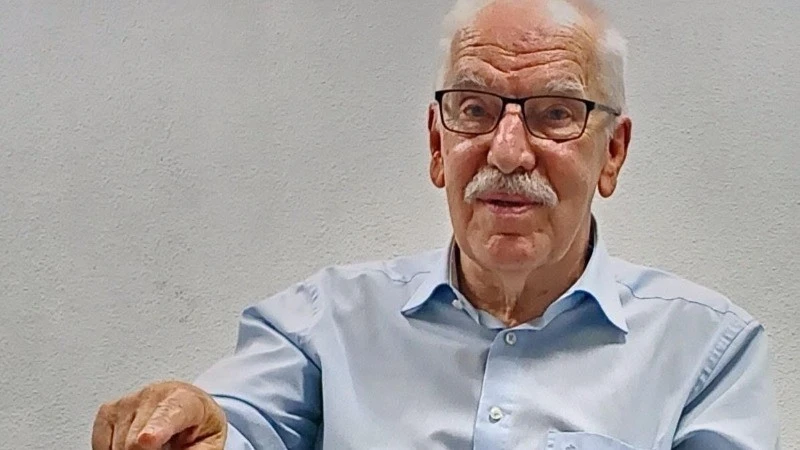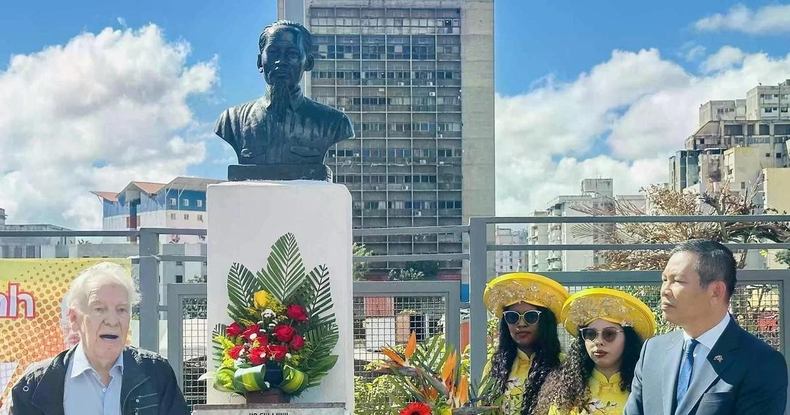Nhan Dan Newspaper has had the opportunity to speak with Dr Carolus Wimmer, Head of External Relations of the Communist Party of Venezuela and President of the Venezuela–Vietnam Friendship House, on the occasion of the 135th anniversary of President Ho Chi Minh’s birth (May 19, 1890–2025).

Dr Carolus Wimmer (Photo: Courtesy of the interviewee)
During the conversation, Dr Wimmer shared his insights on promoting Ho Chi Minh’s ideological legacy. In particular, he highlighted the core similarities between President Ho Chi Minh and national liberation hero Simon Bolivar in their ideals of independence, freedom, and social justice, asserting that these ideals form the foundation of people-to-people diplomacy between Venezuela and Viet Nam.
He also underlined the shared vision of President Ho Chi Minh and national liberation hero Simon Bolivar on the central role of education and journalism in reaching and empowering the masses.
Reflecting on the cooperation between Viet Nam and Venezuela in the fields of cultural and educational exchange, Dr Wimmer praised the effectiveness of ongoing initiatives and stressed the importance of deepening bilateral cooperation.
To better engage young people, he shared that the Venezuela–Vietnam Friendship House will soon inaugurate the Ho Chi Minh School of Political Theory and organise more activities focused on culture and language. He expressed hope that the younger generations of both countries will inherit this legacy through cooperative programmes, particularly in the digital age.
Journalist: Dr Wimmer, could you analyse the core similarities between Ho Chi Minh’s ideology and that of Simon Bolivar in terms of their aspirations for independence, freedom, and social justice? In your opinion, how do these shared values contribute to people-to-people diplomacy?
Dr Wimmer: Ho Chi Minh—revered as “The Enlightener”—continues to shine in the hearts of freedom-loving peoples around the world. President Ho Chi Minh and national hero Simon Bolivar were two outstanding revolutionaries who journeyed thousands of miles along revolutionary paths and wrote volumes to disseminate their ideas until they achieved their dream of national liberation. Both are worthy of the utmost respect and admiration from all peoples.
 |
|
The Venezuela–Vietnam Friendship Association,in coordination with the Embassy of Viet Nam in Venezuela, organises a wreath-laying ceremony in memory of President Ho Chi Minh at Bolivar Avenue in Caracas. (Photo: Courtesy of the interviewee)
|
There are striking parallels between President Ho Chi Minh and Simon Bolivar in their leadership style, emphasis on moral education, and the role of the press as a tool to guide the public. Both were not only heroes of national liberation and founders of their respective republics, but also military strategists with the common goal of achieving independence, freedom, and social justice.
The historical role of President Ho Chi Minh and Simon Bolivar in the revolutionary struggles of Viet Nam and Venezuela can be interpreted through the lens of Russian Marxist philosopher Georgi Plekhanov in his 1898 essay “The Role of the Individual in History.”
Plekhanov wrote: “A great man is one who perceives more clearly than others the needs of his time and acts on them more decisively. He solves historical problems already posed. He recognises new social needs arising from old social relations and seeks to meet those needs. Such men are heroes not because they can alter the natural course of history, but because their actions reflect the conscious and free expression of an objective and inevitable process. In this lies their greatness and power.”
In their pursuit of independence, freedom, and social justice, both Ho Chi Minh and Simon Bolivar regarded the education of the people as a crucial factor.
“Knowledge is the happiness of human life,” Bolivar once wrote to his sister in 1825. He also declared: “An uneducated person is an incomplete person,” and “Nations march toward glory at the pace of their education.”
President Ho Chi Minh asserted: “To build socialism, we must first build socialist people,” meaning that education must develop individuals with both competence and virtue.
According to Bolivar’s ideology, “Morality and enlightenment are the twin pillars of the republic. They are our foremost necessities.” He emphasised that talent without virtue is a danger.
This fusion of talent and virtue is at the heart of Ho Chi Minh’s philosophy on education. For him, the product of education must be people who “know how to learn to do, learn to be human and learn to be cadres.”
Another similarity between President Ho Chi Minh and Simon Bolivar lies in their views on mass communication.
In 1818, Bolivar founded the newspaper Correo del Orinoco, a critical tool for spreading information during the war for independence. He considered journalism to be no less vital than weaponry, referring to it as “the artillery of thought.”
For President Ho Chi Minh, journalism was also an essential weapon in the revolutionary struggle. While in Paris, he co-founded the newspaper Le Paria (The Pariah), first published on April 1, 1922. In China, he launched the paper Thanh Nien (Youth), with its inaugural issue on June 21, 1925.
The ideological parallels between Simon Bolivar and Ho Chi Minh have laid a strong foundation for practical initiatives and programmes that reinforce and expand people-to-people diplomacy between Viet Nam and Venezuela.
Journalist: As President of the Venezuela–Vietnam Friendship House, how do you assess the cultural, sports, and academic exchange programmes that have been organised so far?
Dr Wimmer: We are still in the early stages of realising people-to-people diplomacy through these exchanges. Practical initiatives must continue to be developed from the grassroots level. In Venezuela, we promote a model where communities themselves propose, discuss, and decide on programmes.
While there are certainly limitations, we are confident that greater success will follow, especially with strong coordination between the Venezuela–Vietnam Friendship Association (CAVV), the Embassy, and the private sector—including businesses from both countries—who can support and sponsor the association’s proposed initiatives.
Journalist: What media channels have you used to introduce Ho Chi Minh’s ideological legacy to the Venezuelan public? In your view, what is key to ensuring that this message resonates with young people?
Dr Wimmer: This is a very practical question. We began modestly with the assocition’s official newsletter “Juntos con Viet Nam” (Together with Viet Nam). We also utilise social media, participate in major radio networks, and host seminars exploring various aspects of Ho Chi Minh’s thought and contemporary issues in Viet Nam—particularly the building of socialism, which we view as a fundamental goal.
Generating interest in Viet Nam among young Venezuelans is challenging but entirely possible. At CAVV, we focus on connecting through universities. For example, we have a cooperation agreement with the National Experimental University of the Armed Forces (UNEFA), where a department dedicated to Vietnamese culture has been established.
CAVV also carries out similar activities in working-class neighbourhoods across Caracas, aiming for nationwide outreach. We regularly organise cultural and sports exchanges, alongside seminars that promote political theory among young people and the community at large.
Our headquarters will soon house the Ho Chi Minh School of Political Theory, a space for all age groups but especially the youth. Planned offerings include courses on the Vietnamese language, folk dance, cuisine, and the martial art of Vovinam—all of which strongly appeal to young people.
For instance, we have successfully held two basic Vietnamese language courses with 50 participants. Due to a shortage of teachers, we have yet to expand further, but we believe this obstacle can be overcome in the near future.
Journalist: In promoting Ho Chi Minh’s thought in Venezuela, what challenges has the Venezuela–Vietnam Friendship House faced in terms of language and cultural differences? Could you share specific solutions to turn those challenges into opportunities?
Dr Wimmer: In Venezuela, people hold profound respect and admiration for President Ho Chi Minh, the Vietnamese people, and the Communist Party of Viet Nam. While cultural differences exist, they do not act as barriers; rather, they spark positive curiosity and interest.
The greatest challenge is the language barrier. That’s why we launched our digital newsletter “Juntos con Viet Nam”, which republishes both historical and current political documents. To support this, we frequently reference Vietnamese newspapers and official publications from the Communist Party of Viet Nam, particularly the Communist Review. In the future, we hope to receive more materials—journals, books, and documents—to support CAVV’s academic programmes.
CAVV is also involved in educational programmes for the Bolivarian National Armed Forces (FANB), especially on topics related to Viet Nam’s history and struggles.
Journalist: On the occasion of President Ho Chi Minh’s birthday, what are your hopes for how young generations in Viet Nam and Venezuela will study and carry forward his ideological legacy through educational and cultural exchange programmes? Do you have specific proposals to realise this vision, especially in the context of globalisation and digital technology?
Dr Wimmer: As mentioned, the soon-to-be-inaugurated Ho Chi Minh School of Political Theory will play a pivotal role in this endeavour. Once we overcome the language barrier, we can fully implement engaging programmes jointly organised by the Viet Nam–Venezuela Friendship Association (AAVV) in Ha Noi and the Venezuela–Vietnam Friendship Association (CAVV) in Caracas.
These two associations, with the support of state agencies and the private sector, must become pioneers in advancing people-to-people diplomacy between Venezuela and Viet Nam.
Journalist: Thank you very much!
(Source: en.nhandan.vn)